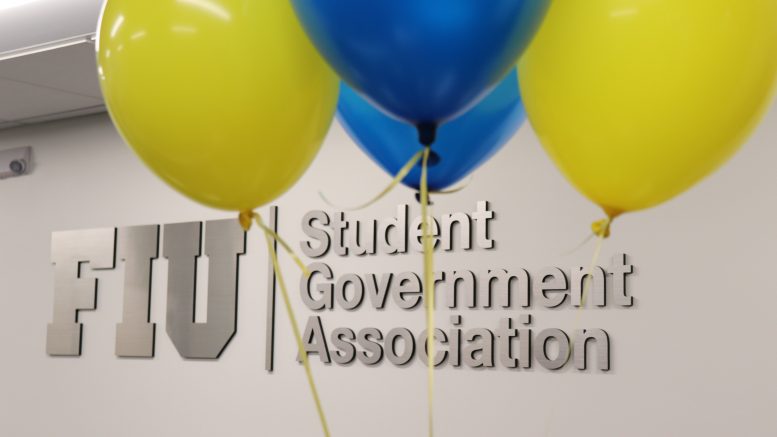By: Joshua Ceballos/News Director and Gerard Albert/Staff Writer
For the first time in a generation, the University’s two Student Government Councils will merge into one governing body, though not everyone involved is completely on board.
In an email sent to Student Media and several University administrators, Larry Lunsford, vice president for Student Affairs, wrote that at the conclusion of the spring 2019 elections, a single SGA will be in place. The current SGA will run under the two council structure but will be planning for the changes.
The University has had a separate SGC for the Modesto Maidique campus and for the Biscayne Bay campus since 1992; two presidents, two vice presidents, two senates. These councils, though welcome to collaborate, operated on their own, even having separate elections procedures: MMC presidents and VP’s run on a joint ballot, while at BBC they run independently of one another.
Now with the new group of student government elected officials in office, talks of merging the two councils have moved into an official planning stage, according to Anthony DeSantis, assistant vice president for Student Affairs.
Discussion of the merger did not just begin this summer. The idea originally came up during talks by the constitutional review committee held in November 2017, though the issue was tabled in December when then SGC-BBC president Leo Cosio stepped away from the discussion.
Cosio told Student Media that he initially supported the merger but doubted the practicality of the plan when it was first discussed. He felt that the SGC’s were not ready and that the plans were being rushed by the FIU administration who was setting the pace and the guidelines, something Cosio said should be the other way around.
“I still believe that it is the right move, it just needs to be done the right way,” said Cosio.
To Cosio this means the student government and the administration working together to find what works best. Cosio is in favor of a plan that includes one president that will serve FIU as a whole and one senate that will do the same. The senate seats were a hotbed topic in the past discussions of the merger, with SGC-BBC wanting to ensure they had enough seats to represent the BBC student body, according to Cosio.
The reason that the original discussions about merging the councils broke down, according to DeSantis, was a lack of time to properly plan and communicate with students.
Jefferson Noel, SGC-BBC president, told Student Media that he was initially against the idea of a merger when he was speaker pro tempore of the senate and is still open to exploring other options as president.
Noel said he prefers the two SGC system because his constituents prefer how it is now. He’s also not fully convinced that the merger is the best solution to the problems that SGA faces.
Better communication and better representation in the administration for BBC students are problems Noel said need to be addressed by the current SGA and may be fixed by the merger.
Noel said that communication has to be intentional and desired and is something he’s been working on with Jose Sirven, SGC-MMC president.
In an interview with Student Media, Sirven also said that he and Noel have been working together to move forward officially with merging the councils.
“We’re happy that we’re finally able to do what should’ve been done 10 years ago… to finally create a student government that can serve all the students at FIU, including at the Engineering Center, FIU at I-75 and FIU Online,” Sirven said.
The main reason behind the merger, according to Sirven, is that the two-council structure did not represent the reality of FIU’s population. Sirven said that when SGA split in 1992, demographics were very different. BBC had about 20,000 students and MMC had about 25,000 students, whereas the split is now about 6,000 at BBC and 30,000 at MMC, according to accountability.fiu.edu.
A further issue, according to Sirven, is that currently only the MMC president may sit on the Board of Trustees for the University, so BBC does not get as much attention as it could at the BOT meetings.
The current structure also creates another issue for online students and students at the I-75 campus, according to Sirven, as they don’t have their own councils. By creating one council, Sirven and his colleagues hope to tackle issues that are university wide for the whole student body.
The new Engineering Campus Council, according to Sirven, is a possible example for how a unified SGA may advocate for the various student clusters: making smaller councils to represent issues of the different campuses without creating a full-fledged student government there.
A new constitutional review committee will be meeting throughout the entire summer semester to plan out how the one government will work, such as creating a new constitution, elections code, and bylaws, according to DeSantis. The meetings will be open to the public, and students attending will have the opportunity to voice their suggestions and concerns.
“What happens with the merger will affect the students, but more important is that students are involved in the process,” said Noel. “Involvement in this micro government system reflects the willingness to participate in the democratic process outside the university. We want the students to be engaged citizens in and out of the university.”
Feature Image by Nicole Malanga/PantherNOW






Be the first to comment on "SGA to move forward with campus council merger in 2019"